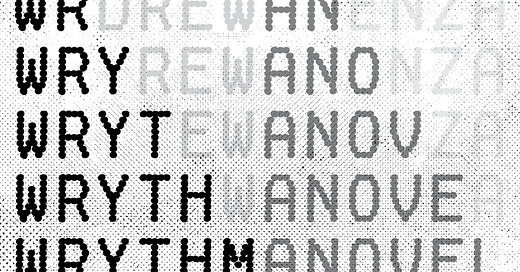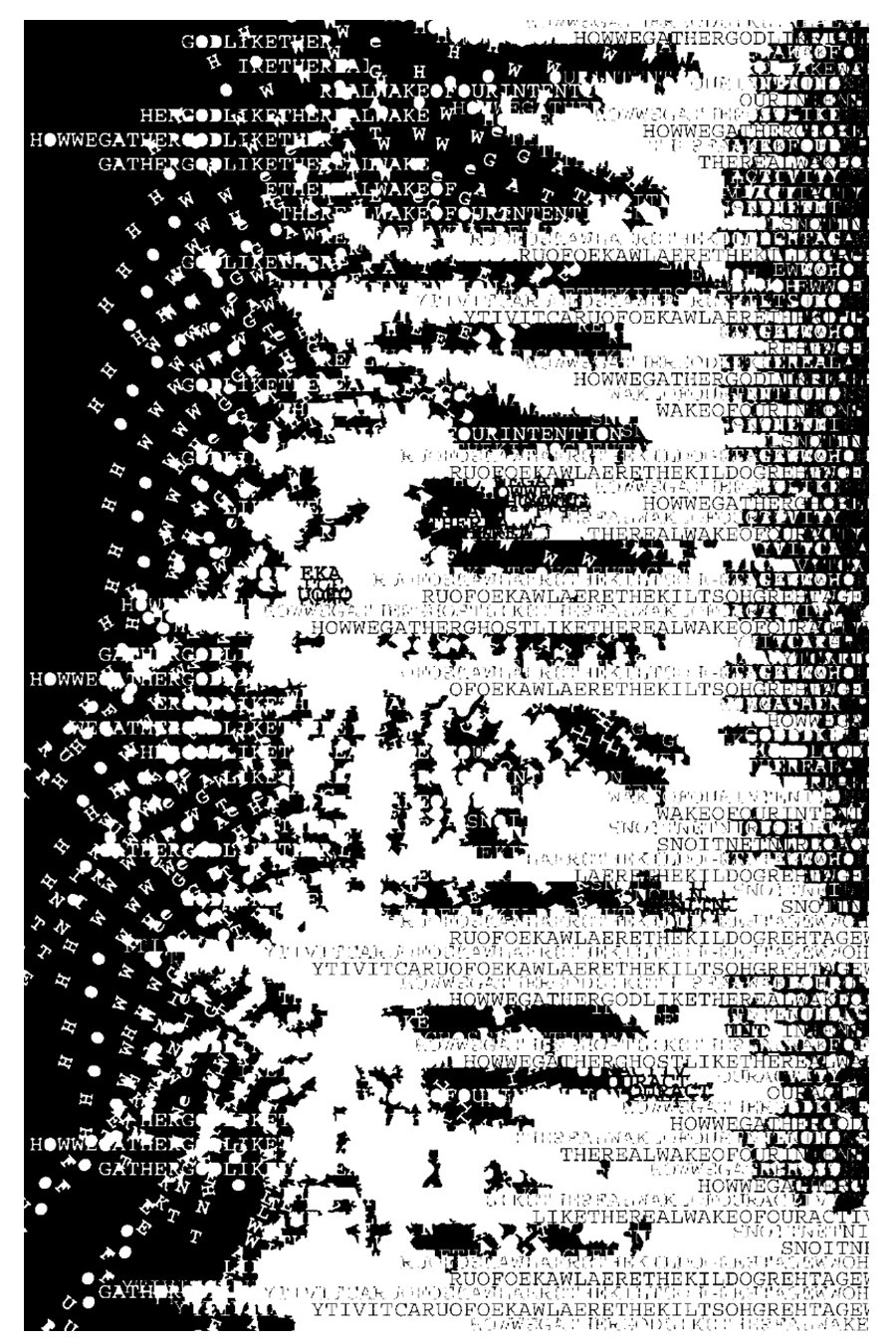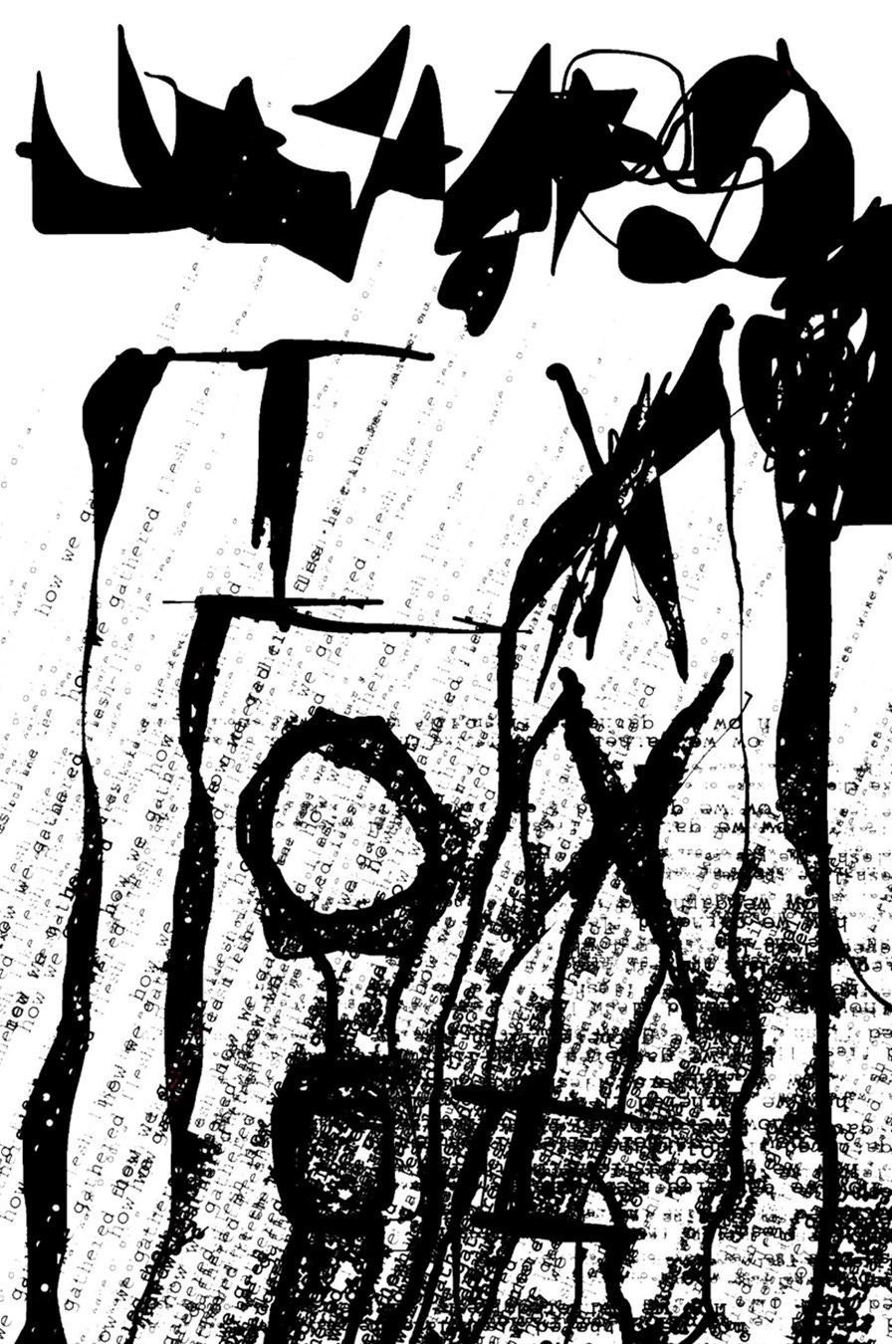This summer I had the privilege of editing Andrew Brenza’s debut novel, a BEGOTTEN-like origin myth of artificial intelligence forthcoming from Montag Press. Below is the excellent cover by Alban Fischer, and a few of Andrew’s visual poems that compliment the text.
Now at Childhood’s End, knowing how fast the summer can fade, who dares answer the question, “What, then, is artificial intelligence?”
Should it be MIT’s Lex Freidman with all his mawkish talk of love? John Searle shouting poorly-articulated Mandarin from inside his Chinese Room? A doom-scrying Manhattanite luddite living off royalties of a dead prophet model that prognosticated the screaming to come across the sky fifty years previous? Peter Diamandis utopianly and eugenically rectifying your child’s perceived deficiencies at birth? Technocapitalist ghouls market-capping our minds at Neuralink and Kernel?
In The Question Concerning Technology, Heidegger reminds that the word techne once meant “the poiesis of the fine arts.” By understanding technology not as Adversary, but as “a way of revealing,” a better question unconceals a late human stage upon which people of praxis such as Andrew Brenza might perform their poiesis, “What are poets for?”
To be a poet in a destitute time means: to attend, singing, to the trace of the fugitive gods. This is why the poet in the time of the world's night utters the holy.
While the question “What is AI?” remains indeterminate, we, at Montag, can assure you the destitute time of the world’s night has come falling from the sky. Destitution greeted me in a Subway on Tuesday when my sandwich artist was The Terminator, causing me to think, “Hey, that’s novel.” Destitution yanks our causal chain and asks if we’re happy with our current car insurance, because this permanent destination vacation knows everything we’ve done, and can come to encompass all we’ve ever thought, should we lack Brenzanean vigilance.
Wellcome to the time of the world’s night! It may still seem like mid-day as the NFL pre-season festival of concussive atonement recurs with all the renewable energy required to unchain the earth from the sun. This is the time when we are still being, sort of, but being enframed in the dire technological time of artificial intelligence killing in India—as you know, and tracking the eye movements of the Chinese citizenry—as you know. Destitution is trying to sell you the Ray-Ban Stories you just bought, which is forever the same old story: moonlight and love songs; a case of do or die.
Andrew Brenza’s poetic pugnacity is needed as we near the PERMANENT MIDNIGHT of unclean and automated commercial language, an insatiable will to surveillant power, last news cycle’s neoliberal drone war, and the forthcoming power grid attacks that leave us fighting like wild-eyed fiends over a can of dubiously-nutritious Alpo. It is necessary for observant Andrews now in the world’s night to sing of these Times We’ve Known, to sing of Gods on the Elisa Lam because as Holderlin writes,
But where danger is, grows The saving power also.
Enframed within an empty set of Disneyfied imagery, every book of Revelations doomed to small press-tier non-relevance, the saving power must arise from within the technological frame. As Andrew invokes technologies rudimentary as Notepad and Publisher, these words and images of whom might still safely be called a human being clear a vantage towards our saving power. Intelligence and humanity is not a strict identity, he may be saying, and yet an artificial intelligence does need to be predicated upon a human one, meaning our doom is not exactly necessary.
Accordingly, Advance Review Copies have been mailed to remind each and every Las Vegas Raider of the Safeway when the game is played for all of ontology at Caesars—the proper arbitrage position that Poetry, Language, Thought and humanity must remain tenuously and tenderly entwined. If songs such as Andrew’s don’t ring out the saving power, aren’t sung towards the trace of what Nietzsche knew to be the “holiest and mightiest of all that the world has yet owned” then the whole sacred game will play itself again without The New Music, with only hauntological Best of Joni Mitchell one-song playlists insisting on paved paradises, thereby undermining the depth and breadth of a Bunyan-sized oeuvre of human creativity capable of holding moments in the depth of care.
Michael Sauve,
East Beaches, Toronto
August 2022
Works Referenced
Martin Heidegger, The Question Concerning Technology
Martin Heidegger, What are Poets For?
Friedrich Nietzsche, The Gay Science
Works Obliquely Referenced
Arthur C. Clark, Childhood’s End
Thomas Pynchon, Gravity’s Rainbow
Charles Aznavour, The Times We’ve Known
Elisa Lam, Sacrificial Fuguerre
Bob Dylan, When the Night Comes Falling From The Sky
Dooley Wilson, As Time Goes By
Donald Barthelme, The New Music
Vashti Bunyan, Another Diamond Day








